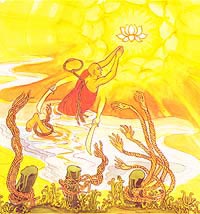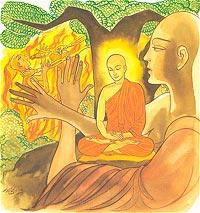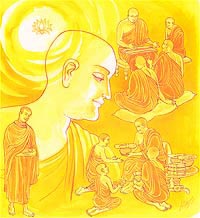61012 Saturday LESSON 714 மூன்று கூடைகள் திபிதக![]() TIPITAKA from FREE ONLINE eNālāndā Research and Practice UNIVERSITY through http://sarvajan.ambedkar.org- Sutta Piṭaka மதிய திரள் மஜ்ஜிம நிகாய Majjhima Nikāya -முழு சரம்
TIPITAKA from FREE ONLINE eNālāndā Research and Practice UNIVERSITY through http://sarvajan.ambedkar.org- Sutta Piṭaka மதிய திரள் மஜ்ஜிம நிகாய Majjhima Nikāya -முழு சரம்
(புத்தசமய புனித நூ லின் ஒரு
பாகம்) ஸப்பாஸவ ஸுத்தா Sabbāsava Sutta
(MN 2)-Dhammapada Verse 377Pancasatabhikkhu
Vatthu

மதிய
திரள் மஜ்ஜிம நிகாய
Majjhima Nikāya
— The discourses of
medium length —
[ majjhima: medium ]
புத்தரால்
கொடுக்கப்பட்ட
152 மத்திம
( நடுத்தரமான
நீட்சி
) பல்வேறு
வகைப்பட்ட
விஷயங்கள்
செயல்
தொடர்புடன்
போதனையுரைகள்
கொய்சகமாக்கப்பட்டது.
The
Majjhima Nikāya gathers 152 discourses of the Buddha of intermediate length,
dealing with diverse matters.
முழு
சரம் (புத்தசமய புனித நூ லின்
ஒரு பாகம்) ஸப்பாஸவ ஸுத்தா
மிக சுவாரசியமான
சரம், மன தை
நுரைகொள்விக்கிற வேறுமாதிரியான வழிவகை ஆசூச(புனிதத்த்னமையைக் கெடுத்தல்) நிவாரணம்.
Sabbāsava Sutta
(MN 2) - enhanced ATI
Very interesting sutta, where
the different ways by which the āsavas, fermentating defilements of the mind,
are dispelled.
பய
சரம் (புத்தசமய புனித நூ லின்
ஒரு பாகம்) பயபேரவ
ஸுத்தா இச்சரத்தில்,
இதரபதார்த்தங்களுடன், புத்தர் மூன்று விஞ்ஞான ஞான ங்களை, அவர் இராத்திரி பொழுதில் அவருடைய முயற்சியினால் அடை ஞானோதயங்களை விவரிக்கிறார்.
Bhayabherava
Sutta (MN 4) {excerpt} - enhanced ATI
http://www.youtube.com/watch?v=sYPRh4tzB98
In this sutta, among other
things, the Buddha expounds the three vijjās he attained during the night of
his awakenment.
உடுப்பு
(போர்வைகள்) சரம் வத்திர ஸுத்தா இச்சரத்தில், இதரபதார்த்தங்களுடன், புத்தர் பதினாறு
உபக்கிலேஸஸ் ஒழுக்கச் சீர்க்கேடுகளை
வரையறை செய்கிறார்.
Vattha Sutta (MN
7) {excerpt} - enhanced ATIIn this sutta, the Buddha,
among other things, defines sixteen upakkilesas.
மாபெரும்
அரச மரபு
சரம் (புத்தசமய புனித நூ லின்
ஒரு பாகம்)
ஒரு புகழ்பெற்ற
இலங்கையைச் சார்ந்த
வரலாற்று புகழ், பாளியில், ஐந்தாவது நூற்றாண்டில், மஹாநாமா என்ற பெயருடைய
பிக்குவால் எழுதி வைக்கப்பட்டிருக்கிறது.
- பன்னிப்பன்னிச் சொன்னது.
ஸாரிபுத்த,
ஆயஸம மஹாகொத்திக கேட்ட பற்பலவிதமான சுவாரசியமான வினாக்களுக்கு விடைகூ றி மற்றும்
இந்த நுலிலிருந்து எடுத்த பகுதியில்,
அவர், வேதனா(உறுதலுணர்ச்சி, புலன்றிவு, புரிவு, வலி,
துன்பம் ,
ஸன்யா, (புலனுணர்வு ,
விழிப்புணர்வுநிலை , மனத்தின் அறிவுத்திறம் , எண்ணம் , குறி , குறிப்புணர்த்தும் உடலுறுப்பசை வியக்கம் , விஞ்ஞானவை
(அறிவாற்றல், அறிவு ,
உள்ளம் ) தெளிவாக விளக்கி விரித்துரைக்வில்லை ஆனால் ஆழ்ந்து செறிக்கப்பட்டிருக்கிறது.
Mahāvedalla Sutta
(MN 43) {excerpt} - word by word
Sāriputta answers various
interesting questions asked by āyasmā Mahākoṭṭhika, and in this excerpt, he explains that
Vedanā, Saññā and Viññāṇa are not clearly delineated but deeply
interwoven.
ஒற்றை
உடல் உச்சி
சவரத் தலை மேலான
குடுமி உரோமம்,
ஒரு மண்டவரி மேடு,
தழைமுடி சரம் (புத்தசமய புனித நூ லின்
ஒரு பாகம்)- எளிய முதுப்பாடம்
பிக்குனி
தம்மாதின்னா, விஸாகா கேட்ட ஒரு தொடர் சுவாரசியமான வினாக்களுக்கு விடைகூ றி, அவர், இதரபதார்த்தங்களுடன்,
20-மடக்கு
சொற்பொருள் விளக்கம்
கொடுகிறார்.
Cūḷavedalla Sutta (MN 44)
{excerpt} - plain texts
The bhikkhuni Dhammadinnā
answers a series of interesting questions asked by Visākha. Among other things,
she gives the 20-fold definition of sakkāyadiṭṭhi.
ஸெக்கா
நாயுருவி செடி சரம் (புத்தசமய புனித நூ லின் ஒரு பாகம்)- செழுமைப்படுத்திய ATI
புத்தர் ஆனந்தாவை ஸெக்கா
நாயுருவி செடி பத்திப்பதா உட்புகுதல் அர்த்தசாரம் சொல்ல வினவுகிறார், அவர் ஒரு திடீரடியான அறிய ஆர்வ
முள்ளதை தேடி ஒரு மாற்று
தொடரை மேற்பாடமாகக்கொண்டு ஏழு நல்லதான தன்மைகளை பதிப்புரு ஞாபகசக்தி தடங்க ல்களை கைவிடுதலுக்கு
மற்று உதாரணங்கள் முதலியவைகளால் தெளிவாக்கப்பட்ட
உவமைகளுடன் சொல்கிறார்.
Sekha Sutta (MN
53) - enhanced ATI
The Buddha asks Ānanda to
expound the Sekha Paṭipadā, of which he gives a surprising version,
from which Satisampajañña and Nīvaraṇānaṃ Pahāna are curiously replaced by a series of
seven ‘good qualities’, and which is illustrated by a telling simile.
புவேதானிய
சரம் (புத்தசமய புனித நூ லின்
ஒரு பாகம்)- பன்னிப்பன்னிச் சொன்னது.
இந்த
நூலிலிருந்து ஒரு சுருக்க
பகுதியை, புத்தர் ஐந்து தரம் அல்லது ஆக்கக் கூறு புலனுணர்வுக்கு ஆட்பட்ட
இன்பநுகர்வு மற்றும் ஓர் முக்கியமான இன்னொரு வகை இன்பநுகர்வுடன் ஒப்பீடு செய்து வரையறுக்கிறார்.
Bahuvedanīya
Sutta (MN 59) {excerpt} - word by word
In this short excerpt, the
Buddha defines the five kāmaguṇās and makes an important comparison with
another type of pleasure.
சுவாசம்
உள்ளுயிர்ப்பு மற்றும் மூச்சுவிடல் (மூச்சு உட்சுவாசி மற்றும் வெளியிடு) சரம் (புத்தசமய
புனித நூ லின்
ஒரு பாகம்)- பன்னிப்பன்னிச் சொன்னது.
புகழ்பெற்ற
சுவாசம் உள்ளுயிர்ப்பு மற்றும் மூச்சுவிடல் பயிற்சி செய்தல்
மற்றும் எப்படி நான்கு கவனிப்பை ஸ்தாபித்து (முனைப்பார்வமுள்ள தியானம்) பயிற்சி செய்ய
முன்னோடியாக மற்றும் பின்னர் ஏழு போதியின்
உறுப்பினர் அல்லது ஆக்கக் கூ ற்றை
எய்த புத்தரின் உச்ச உயர்வான
ஞான னோதயங்களை எய்த வேண்டி நிவர்த்திசெய்தல்.
Ānāpānassati
Sutta (MN 118) - word by word
The famous sutta about the
practice of ānāpānassati, and how it leads to the practice of the four satipaṭṭhānas and subsquently to the fulfillment of the
seven bojjhaṅgas.
ஆறு
புலனுணர்வு ஞானேந்திரிய சரம் (புத்தசமய புனித நூ லின் ஒரு பாகம்)- எளிய முதுப்பாடம்.
இந்த
ஆழமான மற்றும் மிக சுவாரசியமான சரம், புத்தர் இதரபதார்த்தங்களுடன் எது மகிழ்வளிக்கிற
புலனாய்வு, மகிழ்ச்சியற்ற மற்றும் நடுநிலை மனஞ் சார்ந்த உள்ளுணர்ச்சிகள், மற்றும் கூடுதலாக புத்தரை
பற்றிய தரமான வர்ணனை சொற்றொடரில் கண்டுபிடிக்கப்பட்டதை வரையறுக்கிறார்.
Saḷāyatanavibhaṅga Sutta (MN 137) {excerpt}
- plain texts
In this deep and very interesting sutta, the
Buddha defines among other things what are the investigations of pleasant,
unpleasant and neutral mental feelings, and also defines the expression found
in the standard description of the Buddha: ‘anuttaro purisadammasārathī’.
——————oooOooo——————
மதிய திரள் மஜ்ஜிம நிகாய Majjhima Nikāya
முழு சரம்
(புத்தசமய புனித நூ லின் ஒரு
பாகம்) ஸப்பாஸவ ஸுத்தா Sabbāsava Sutta
(MN 2)
http://www.youtube.com/watch?v=iSwDrWENbQI
for
In HD - San Diego 2012 MN 2 All the Taints -
Sabbāsava Sutta
Dhammapada Verses 345 and 346 Bandhanagara Vatthu -Verse 345. Bonds Of Attachment-Verse 346. Bonds Are Strong, But The Wise Get Rid Of Them
>> Tipiṭaka >> Sutta Piṭaka >> Majjhima Nikāya
முழு சரம்
(புத்தசமய புனித நூ லின் ஒரு
பாகம்) ஸப்பாஸவ ஸுத்தா
மிக சுவாரசியமான
சரம், மன தை
நுரைகொள்விக்கிற வேறுமாதிரியான வழிவகை ஆசூச(புனிதத்த்னமையைக் கெடுத்தல்) நிவாரணம்.
Sabbāsava Sutta
(MN 2) - enhanced ATI
Very interesting sutta, where
the different ways by which the āsavas, fermentating defilements of the mind,
are dispelled.
Pāḷiபாளி ஏவங் மே ஸுத்தங்: ஏகங் ஸமயங். பகவா ஸாவத்யங் விஹாரதி ஜேதவனே அனாதபிண்டிகஸ்ஸ ஆராமே. தத்ர பகவா Evaṃ me sutaṃ: ekaṃ samayaṃ bhagavā -பிக்காவோ‘தி. |
Englishதமிழ் நான் கேட்டுக்கொண்டிருந்தேன்: ஓர் சமயம் பகவான் EnglishI have heard that on one occasion the Blessed
-பிக்குகளே. English |
|
– ‘bhikkhavo’ti. - ‘பந்தே‘தி தே பிக்கு பகவதோ பச்சஸ்ஸோஸுங். பகவா எததவொச: – ‘Bhadante’ti te bhikkhū bhagavato paccassosuṃ. Bhagavā etadavoca: -‘ஸப்பாஸவஸங்வரப்பரியாயங் |
– Monks!
- அப்படியே ஆகுக ‘பந்தே’ என பிக்குகள் English– Yes, lord, the monks
-‘முழு English
|
|
– ‘Sabbāsavasaṃvarapariyāyaṃ vo, bhikkhave, desessāmi. Taṃ suṇātha, |
– Monks, I will teach you the
|
|
-‘ ஏவங், – ‘Evaṃ, bhante’ti kho te bhikkhū - ஜாந்தோ |
-‘ அப்படியே ஆகுக ‘பந்தே’ என பிக்குகள் English– As you say, sir, the monks
-நான் போதிப்பேன், பிக்குகளே, நொதித்தல்களின் English |
|
– Jānato ahaṃ, bhikkhave, passato அத்தி, பிக்காவே, ஆஸவா தஸ்ஸனா |
– Monks,
அவ்விடத்தில், பிக்குகளே, பார்பதால் கைவிடப்படவேண்டிய English |
|
Atthi, bhikkhave, āsavā dassanā |
There are fermentations to be |
please watch:
http://www.rtbot.net/Majjhima
http://wisdomthroughmindfulness.blogspot.in/2011_08_01_archive.html
http://zomobo.net/middle-length-discourses




Dhammapada Verse 377
PancasatabhikkhuVatthu
Vassika viya pupphani
maddavani pamuncati
evam raganca dosanca
vippamuncetha bhikkhavo.Verse 377: O bhikkhus! As the jasmine (vassika)
plant sheds its withered flowers, so also, should you shed passion and ill will.
The Story of Five Hundred Bhikkhus
While residing at the Jetavana
monastery, the Buddha uttered Verse (377) of this book, with reference to five
hundred bhikkhus.Five hundred bhikkhus from
Savatthi, after taking a subject of meditation from the Buddha, set out for the
forest to practise meditation. There, they noticed that the jasmine flowers
which bloomed in the early morning dropped off from the plants onto the ground
in the evening. Then the bhikkhus resolved that they would strive hard to free
themselves from all moral defilements even before the flowers were shed from the
plants. The Buddha, through his supernormal power, saw them from his Perfumed
Chamber. He therefore sent forth his radiance to them and made them feel his
presence. To them the Buddha said, “Bhikkhus! As the withered flower is
shed from the plant, so also, should a bhikkhu strive to free himself from the
round of rebirths.”Then the Buddha spoke in verse as
follows:
Verse 377: O bhikkhus!
As the jasmin (vassika) plant sheds its withered flowers, so also,
should you shed passion and ill will.At the end of the discourse the five hundred bhikkhus attained arahatship.
30912 Sunday to 51012 Friday LESSON 713 FREE ONLINE eNālāndā Research and Practice UNIVERSITY through http://sarvajan.ambedkar.org-Dhammapada Verses 368 to 376 Sambahulabhikkhu Vatthu-Verse 368. The Monk Who Radiates Loving-Kindness Radiates Peace-Verse 369. Give Up Lust And Hatred-Verse 370. Flood-Crosser Is One Who Has Giver Up The Fetters-Verse 371. Meditate Earnestly-Verse 372. There Is No Wisdom In Those Who Do Not Think-Verse 373. He Who Is Calm Experiences Transcendental Joy-Verse 374. He Is Happy Who Reflects On Rise And Fall-Verse 375. A Wise Monk Possess His Cardinal Virtues-Verse 376. A Monk Should Be Cordial In All His Ways
 |
Verse 368. The Monk Who Radiates Loving-Kindness Radiates Peace
Explanation: The monk who extends loving-kindness to all, |
 |
Verse 369. Give Up Lust And Hatred
Explanation: O monk, your boat must be emptied of the water |
 |
Verse 370. Flood-Crosser Is One Who Has Giver Up The Fetters
Explanation: One should break away from the five lower fetter. |
 |
Verse 371. Meditate Earnestly
Explanation: O monk, meditate and do not be indolent. Do not |
 |
Verse 372. There Is No Wisdom In Those Who Do Not Think
Explanation: For one who lacks meditation there is no wisdom. |
 |
Verse 373. He Who Is Calm Experiences Transcendental Joy
Explanation: A monk who enters an empty house, whose mind |
 |
Verse 374. He Is Happy Who Reflects On Rise And Fall
Explanation: When the meditator reflects upon the raise and |
 |
Verse 375. A Wise Monk Possess His Cardinal Virtues
Explanation: The joy experienced as a fore taste of Nibbana, |
 |
Verse 376. A Monk Should Be Cordial In All His Ways
Explanation: One should be courteous and of pleasant behaviour. |
Dhammapada Verses 368 to 376
Sambahulabhikkhu VatthuMettavihari yo bhikkhu
pasanno buddhasasane
adhigacche padam santam
sankharupasamam sukham.Sinca bhikkhu imam navam
sitta te lahumessati
chetva raganca dosanca
tato nibbanamehisi.Panca1 chinde
panca2 jahe
panca3 cuttari bhavaye
pancasangatigo4 bhikkhu
“oghatinno” ti vuccati.Jhaya bhikkhu ma pamado
ma te kamagune ramessu cittam
ma lohagulam gili pamatto
ma kandi “dukkhamidan” ti dayhamano.Natthi jhanam apannassa
panna natthi ajhayato
yamhi jhananca panna ca
sa ve nibbanasantike.Sunnagaram pavitthassa
santacittassa bhikkhuno
amanusi rati hoti
samma dhammam vipassato.Yato yato sammasati
khandhanam udayabbayam
labhati pitipamojjam
amatam tam vijanatam.Tatrayamadi bhavati
idha pannassa bhikkhuno
indriyagutti santutthi
patimokkhe ca samvaro.Mitte bhajassu kalyane
suddhajive atandite
patisantharavutyassa
acarakusalo siya
tato pamojjabahulo5
dukkhassantam karissati.Verse 368: The bhikkhu who lives exercising
loving-kindness and is devoted to the Teaching of the Buddha will realize
Nibbana — the Tranquil, the Unconditioned, the Blissful.Verse 369: O bhikkhu, bale out the water (of
wrong thoughts) from this boat (your body); when empty it will sail swiftly;
having cut off passion and ill will you will realize Nibbana.Verse 370: Cut off the five (the lower five
fetters) give up the five (the upper five fetters); and develop the five
(controlling faculties). The bhikkhu who has freed himself of the five bonds
(passion, ill will, ignorance, pride and wrong view) is called “One who has
crossed the flood (of samsara).”Verse 371: O Bhikkhu, mediate, and do not be
unmindful; do not let your mind rejoice in sensual pleasures. Do not be
unmindful and swallow the (hot) lump of iron; as you burn (in niraya) do
not cry, “This, indeed, is suffering.”Verse 372: There can be no concentration in
one who lacks wisdom; there can be no wisdom in one who lacks concentration. He
who has concentration as well as wisdom is, indeed, close to Nibbana.Verse 373: The bhikkhu who goes into seclusion
(to meditate), whose mind is tranquil, who clearly perceives the Dhamma,
experiences the joy which transcends that of (ordinary) men.Verse 374: Every time he clearly comprehends
the arising and the perishing of the khandhas, he finds joy and rapture.
That, to the wise, is the way to Nibbana (the Deathless).Verse 375: For a wise bhikkhu in this
Teaching, this is the beginning (of the practice leading to Nibbana): control of
the senses, contentment, and restraint according to the Fundamental Precepts.Verse 376: Associate with good friends, who
are energetic and whose livelihood is pure; let him be amiable and be correct in
his conduct. Then, (frequently) feeling much joy he will make an end of dukkha
(of the round of rebirths).
1. The lower five fetters (Orambhagiya
samyojana) are: ego belief (sakkayaditthi); doubt (vicikkiccha); wrong views of
morality and practices (silabbataparamasa); sensual desire (kamaraga) and ill
will (byapada). These can be got rid of by the first, second and third Maggas.2. The upper five fetters (Uddhambhagiya
samyojana) are: craving for fine material existences (rupa raga); craving for
non-material existences (arupa raga); pride (mana); restlessness (uddhacca) and
ignorance (avijja). These five can be got rid of by arahatship.3. The five controlling faculties (Pancindriya)
are: faith (saddha); diligence (viriya); mindfulness (sati); concentration (samadhi)
and wisdom (panna).4. The five sangas are: passion, ill will,
ignorance, pride and wrong views.5. pamojjabahulo: lit., much joy;
according to the Commentary, in this context, frequently feeling joy.
The Story of a Great Many Bhikkhus
While residing at the Jetavana
monastery, the Buddha uttered Verses (368) to (376) of this book, with reference
to nine hundred bhikkhus.Once there was a very rich lady
in the town of Kuraraghara, about one hundred and twenty yojanas from
Savatthi. She had a son who had become a bhikkhu; his name was Sona. On one
occasion, Bhikkhu Sona passed through his home town. On his return from the
Jetavana monastery his mother met him and organized a grand charity in his
honour. Having heard that Bhikkhu Sona could expound the Dhamma very well she
also requested him to expound the Dhamma to her and other people of the home
town. Bhikkhu Sona complied with her request. So a pavilion was built and a
meeting was organized for Bhikkhu Sona to give a discourse. There was a large
gathering at the pavilion; the mother of the bhikkhu also went to listen to the
Dhamma expounded by her son. She took all the members of her household with her
leaving only a maid to look after the house.While the lady was away, some
thieves broke into the house. Their leader, however, went to the pavilion where
the mistress of the house was, sat down near her and kept an eye on her. His
intention was to get rid of her should she return home early on learning about
the theft at her house. The maid seeing the thieves breaking into the house went
to report the matter to her mistress, but the lady only said, “Let the
thieves take all my money, I don’t care; but do not come and disturb me while I
am listening to the Dhamma. You’d better go back.” So the maid went home.There the girl saw the thieves
breaking into the room where her mistress kept all her silverware. Again she
went to the pavilion where her mistress was and reported to her that the thieves
were taking away her silverware, but she was given the same answer as before. So
she had to go back to the house. There she saw the thieves breaking into the
room where her mistress kept her gold and she reported the matter to her
mistress. This time, her mistress shouted at her, “O dear! Let the thieves
take whatever they wish to take; why do you have to come and worry me again when
I am listening to a discourse on the Dhamma? Why did you not go back when I told
you to? Don’t you dare come near me again and say things about the theft or the
thieves.”The leader of the gang of thieves
who was close at hand heard everything the lady had said and he was extremely
surprised. Her words also kept him thinking, “If we take away the property
of this wise and noble person, we will surely be punished; we might even be
struck by lightning and our heads broken into many pieces.” The leader got
alarmed over this possibility and he hurried back to the house of the lady and
made his followers return all the things they had taken. He then took all his
followers to where the mistress of the house was; she was still at the pavilion,
listening attentively to the Dhamma.Thera Sona finished his
exposition on the Dhamma with the crack of dawn and came down from the dais from
where he had expounded the Dhamma. The leader of the thieves approached the
rich, noble lady, paid respect to her and revealed his identity to her. He also
related to her how they had plundered her house and also that they had returned
all her property on hearing her words to her maid, who reported the theft to her
during the night. Then, the leader and all the thieves asked the lady to forgive
them for having wronged her. Then, they asked Thera Sona to admit them to the
Order of bhikkhus. After the admission, each one of the nine hundred bhikkhus
took a subject of meditation from Thera Sona and went to the nearby forest to
practise meditation in seclusion.From a distance of one hundred
and twenty yojanas, the Buddha saw those bhikkhus and sent forth his radiance to
them so that he seemed to be sitting in their midst.Then noticing their individual
dispositions, the Buddha spoke in verse as follows:
Verse 368: The bhikkhu
who lives exercising loving-kindness and is devoted to the Teaching of
the Buddha will realize Nibbana — the Tranquil, the Unconditioned,
the Blissful.Verse 369: O bhikkhu,
bale out the water (of wrong thoughts) from this boat (your body);
when empty it will sail swiftly; having cut off passion and ill will
you will realize Nibbana.Verse 370: Cut off the
five (the lower five fetters) give up the five (the upper five
fetters); and develop the five (controlling faculties). The bhikkhu
who has freed himself of the five bonds (passion, ill will, ignorance,
pride and wrong view) is called “One who has crossed the flood
(of samsara).”Verse 371: O Bhikkhu,
mediate, and do not be unmindful; do not let your mind rejoice in
sensual pleasures. Do not be unmindful and swallow the (hot) lump of
iron; as you burn (in niraya) do not cry, “This, indeed,
is suffering.”Verse 372: There can
be no concentration in one who lacks wisdom; there can be no wisdom in
one who lacks concentration. He who has concentration as well as
wisdom is, indeed, close to Nibbana.Verse 373: The bhikkhu
who goes into seclusion (to meditate), whose mind is tranquil, who
clearly perceives the Dhamma, experiences the joy which transcends
that of (ordinary) men.Verse 374: Every time
he clearly comprehends the arising and the perishing of the khandhas,
he finds joy and rapture. That, to the wise, is the way to Nibbana
(the Deathless).Verse 375: For a wise
bhikkhu in this Teaching, this is the beginning (of the practice
leading to Nibbana): control of the senses, contentment, and restraint
according to the Fundamental Precepts.Verse 376: Associate
with good friends, who are energetic and whose livelihood is pure; let
him be amiable and be correct in his conduct. Then, (frequently)
feeling much joy he will make an end of dukkha (of the round of
rebirths).At the end of each verse, one hundred out of the nine hundred bhikkhus attained arahatship.
![[]](http://sphotos.xx.fbcdn.net/hphotos-ash4/270901_376051579110930_1786736935_n.jpg)